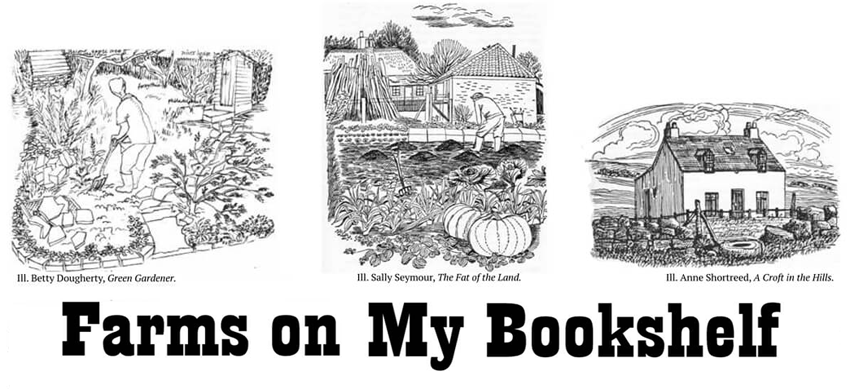Jeanine McMullen and I are complete opposites. I like animals, which is why I don’t have any. I think they are best left to themselves. Above all I do not think animals are humans in disguise. Jeanine McMullen feels a strong need to surround herself with animals, even though by her own account she is an amateur and is often not equipped to look after them. Most of het animals are „ characters”, who „plot against her or put on acts” (most of the humans she meets are larger than life too).
Having said that I must admit I enjoyed these books: she is a good writer. I especially liked the glimpses she gives of her early life in Australia, with her mother, who worked as a nurse in the Outback. I wish she had given us more of those and of her life before becoming a broadcaster. Her obituary states she was a teacher and dancer, too. It made me curious about the rest of her life.
In her first book she tells the story of the impulse buy of a smallholding on a visit to Wales, and of her efforts to interest her bosses at the BBC in a radio programme on the subject. At first she shares the farm with „The Artist” who moves to live there full time, while Jeanine works in London, traveling to Wales in the weekends.
In 1975 she and The Artist separate. Jeanine moves to the cottage permanently, and later her mother, known as Mrs P joins her. Although friends advise her to sell the cottage, Jeanine decides to stick it out, which means years of struggling to pay the bills. She is fortunate in having extremely nice neighbours, one of whom even moves in a few months to help her.
At the start of the story she owns several dogs, then she rapidly acquires homing pigeons, a rabbit, hedgehogs, chickens, ducks, geese, goats, pigs and a cart horse. They all come with special instructions, so to speak. Like Dolores the goat who wreaks havoc everywhere she goes: „ She was in truth the embodiment of every prejudice against the goat and she committed every single crime that legend lays at its door. But she did it with such zest, with such glory in her own wickedness and with so much joy in the sheer wonder of being alive that it seems impossible there had ever been a time when she hadn’t been effectively wrecking our peace and property”.
She meets vet Bertie Ellis: „ a battered red Mini, dragging its exhaust pipe noisily behind it, came to a halt at the gate. A face, adorned with round, granny glasses and a pair of luxuriant mutton-chop whiskers, appeared out of the window: I’m Ellis, it announced”. On his first visit Bertie tells her that her horse Doli, despite displaying all the symptoms is not in foal. „ She’s been having you on, the old sod." (…) I didn’t know who to hate most, Doli or Bertie.
The cottage is damp and droughty, and difficult to heat. Jeanine does not see her way to making any improvements, partly because of her finances and partly, as she quotes C.S.Lewis, because „nature laid on me from birth the utter incapacity to make anything”. She just adapts to her primitive surroundings.
In one of the final chapters her pig Magnolia, ill with peritonitis, is put down by vet Bertie, who uses a very strong anaesthetic. The pig is buried on the farm.
Some months later she finds her whippet Merlin in a coma. He only just survives. It turns out he had been eating from the dead pig, which was not buried deep enough.
Even though her free lance work has virtually dried up, Jeanine keeps hoping to produce her programme on country life: „ the single most important thing I had learned, though, was that everyone who actually survives country life has a story to tell. I no longer wanted to do a programme about the happy peasant tilling his soil; I wanted to get on tape people like the men who drive the massive machines along tortuous lanes and down suicidal slopes to collect garbage from remote villages and farms, or the postmen who struggle through floods and snow and over icy roads to get the latest circulars safely delivered (…) As I worked and worried and walked in the wood, ideas for the programme multiplied. At the the same time, however, the memory of me as a professional broadcaster was fading fast, along with my credibility for the producers. So, as the programme took firmer shape in my mind, it became more and more obvious that I could no longer afford to stay in the place which would have given it birth… My earnings had dropped to a level which wouldn’t even service the mortgage…"
A totally unexpected legacy from her father in Australia puts her back on her feet financially. A year later she once again pitches her idea for a programme and this time she gets to make it. It went on to become a very popular programme on Radio 4. She also wrote two more books (which I will cover in later posts).
Jeanine does not give exact details as to the location of her cottage. Online, I found references to Llyn-y-Far-Fach.
Her obituary refers to her home in Llanddeusant.
She died on 9th February 2010 at tha age of 73.The funeral was at the Parish Church of St Simon and St Jude, Llanddeusant.






